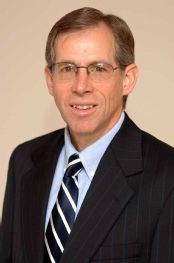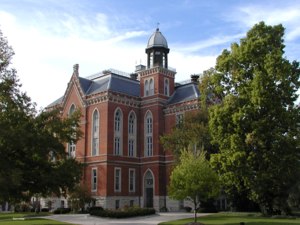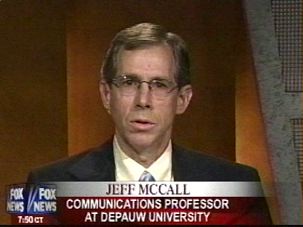Law That Would Protect Journalists' Confidential Sources Could be Doomed, Says Prof. Jeff McCall '76
July 22, 2006
 July 22, 2006, Greencastle, Ind. - "The New York Times' publication of the Bush administration's secret program to monitor international terrorist banking transactions could have an unintended side effect," begins an op-ed by Jeffrey M. McCall, professor of communication at DePauw. "It could lead to the collapse of congressional efforts to create a federal shield law for reporters," adds McCall, a 1976 graduate of the University.
July 22, 2006, Greencastle, Ind. - "The New York Times' publication of the Bush administration's secret program to monitor international terrorist banking transactions could have an unintended side effect," begins an op-ed by Jeffrey M. McCall, professor of communication at DePauw. "It could lead to the collapse of congressional efforts to create a federal shield law for reporters," adds McCall, a 1976 graduate of the University.
In today's Indianapolis Star the professor explains, "Shield laws are designed to protect journalists from being forced by the government to disclose confidential sources. Such confidential sources were used in reporting the financial surveillance story... (and) this incident is sure to be Exhibit A when the proposed shield legislation is argued in Congress."
A bill before the Senate "would 'shield' reporters from having to disclose confidential sources in court, except in specific circumstances related to national security or in preventing a terrorist act. The theory is that these protections are essential in maintaining a free and aggressive press that can effectively monitor the government," Dr. McCall writes. "Allowing journalists to protect the confidentiality of sources, so goes the argument, will encourage inside sources to come forward with information about government misbehavior. From a philosophic standpoint, this all sounds good. When it comes to cold practicality, however, shield laws are controversial and confusing. Critics of the press wonder why journalists should be protected from disclosing sources in court when other citizens would not."
McCall, who is regularly quoted by national reports on media matters, argues, "The proposed legislation basically defines a journalist as a person who is employed by a 'professional' media outlet, apparently leaving out bloggers, pamphleteers and many other mass communicators. This approach smacks of press exceptionalism, the notion that journalists should get special treatment and privileges not available to regular citizens. Given the current public sentiment toward the press, this special treatment might be hard to justify."
is employed by a 'professional' media outlet, apparently leaving out bloggers, pamphleteers and many other mass communicators. This approach smacks of press exceptionalism, the notion that journalists should get special treatment and privileges not available to regular citizens. Given the current public sentiment toward the press, this special treatment might be hard to justify."
McCall also points out that the First Amendment does not differentiate between 'professional' and other media outlets and "guarantees every citizen the same freedom of expression. Shield law proponents say protecting journalists from forced testimony just allows reporters to be on the same plane as medical doctors and lawyers in terms of confidentiality. But journalists aren't the same as doctors and lawyers. Those professionals have extensive formal education and are certified by the state. They protect private people on private matters. Journalists are not certified, have no required education, and gather information specifically to disseminate broadly."
 In closing, Professor McCall asserts, "In an election year, it will be difficult for most congressmen to support shield legislation. The public perception is that such a law would further embolden the press to use confidential sources. The public is angry at the Times for publishing the financial surveillance story -- a result that likely wasn't considered sufficiently by the Times and now diminishes aspects for shield law legislation."
In closing, Professor McCall asserts, "In an election year, it will be difficult for most congressmen to support shield legislation. The public perception is that such a law would further embolden the press to use confidential sources. The public is angry at the Times for publishing the financial surveillance story -- a result that likely wasn't considered sufficiently by the Times and now diminishes aspects for shield law legislation."
Read the essay in its entirety at College News.org.
Jeff McCall was quoted in a Monday Christian Science Monitor story on the moves of Dan Rather, Tom Brokaw and Ted Koppel to cable television outlets. Learn more in this previous story.
Source: Indianapolis Star
Back